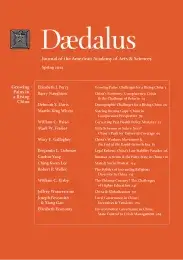Soaring Income Gaps: China in Comparative Perspective
Despite repeated pledges by China's leaders to reduce the gap between rich and poor, income inequality has continued to rise. China's Gini coefficient, a standard measure of income inequality, was higher in 2007 than in the United States, Russia, or most other societies. Why have China's income gaps increased so fast and so far, despite programs designed to promote greater equality? Standard explanations, such as income gaps inevitably rising with rapid economic development or in a post-socialist transition, cannot explain the Chinese case. Paradoxically, the sharp rise in inequality is driven more by the legacy of China's socialist system than by market forces or the global economy. It will not be possible to bring China's soaring income gaps under control unless the new leaders who took power in 2012–2013 are able to make much more fundamental reforms than have been attempted to date.
